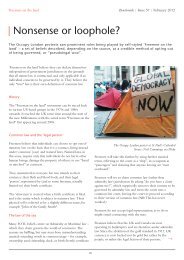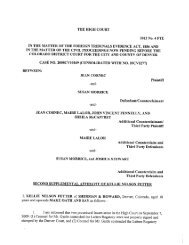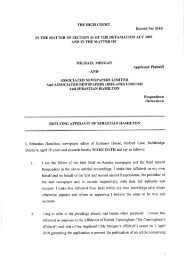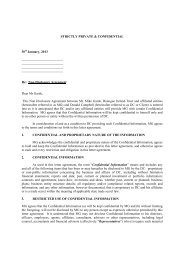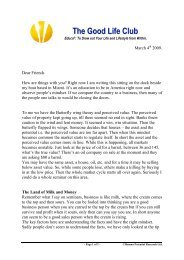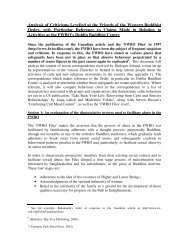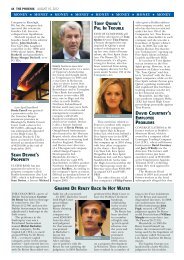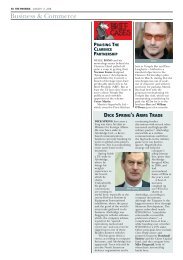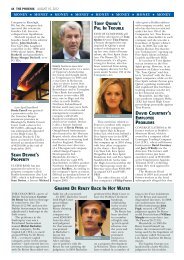EducoBrochure - Dialogue Ireland
EducoBrochure - Dialogue Ireland
EducoBrochure - Dialogue Ireland
You also want an ePaper? Increase the reach of your titles
YUMPU automatically turns print PDFs into web optimized ePapers that Google loves.
The Educational System of the Future – Today!<br />
Ask yourself this question:<br />
‘Do you know more about operating your computer<br />
and mobile phone than your own mind?’<br />
Read on to learn something of how your mind works.<br />
Your Unconscious is Making the<br />
Decisions.<br />
The mind can be divided into two areas,<br />
the conscious mind and the larger<br />
unconscious mind (sometimes referred to<br />
as the subconscious mind). Think of the<br />
conscious mind as more on the surface<br />
and the unconscious as the greater and<br />
deeper part of the mind. Research shows<br />
that the unconscious is largely making our<br />
everyday decisions, with some research<br />
showing as low as 5% conscious input -<br />
the 95% coming from the unconscious.<br />
This realisation, however, is not new. Way<br />
back, Freud maintained that we were puppets in the hands of the<br />
unconscious.<br />
Programs.<br />
Part of the unconscious can be likened to a computer. Think of<br />
the unconscious as the storage hard drive of the mind. The<br />
programs that become imprinted on the person’s mind form their<br />
life. Let’s look at some examples. Take your seven-times<br />
multiplication tables that we learn as children in school. We learn<br />
by repetition using the conscious mind, so we continuously repeat<br />
‘seven ones are seven, seven twos are fourteen, seven threes are<br />
twenty-one’ etc. Eventually this information is stored in the<br />
memory in our storage hard drive - our unconscious. This stored<br />
learning we are calling a program. Now we can operate from this<br />
learning almost without thinking.<br />
If I say to you ‘What is seven times seven?’ the answer, forty-nine,<br />
will be produced instantly by your unconscious. Similarly you<br />
learn a language, how to spell, drive a car etc. Ultimately, a car is<br />
largely driven by your unconscious because you can talk away to<br />
your friends and you do not have to think about it. In short, it’s a<br />
program. However, you began learning to drive using your<br />
conscious mind. You asked yourself ‘Where is the accelerator,<br />
brake, clutch, handbrake?’ No doubt you often had trouble with<br />
the gears and there was much jerking and cutting out of the<br />
engine. With everything, the conscious<br />
learning stage is generally confusing and<br />
stressful. However, once the learning is<br />
accepted by the unconscious it becomes<br />
for the most part automatic and effortless.<br />
The types of programs, both good and<br />
bad, which we all have stored consist of<br />
our learnings, experiences, memories,<br />
mindsets, beliefs, fears, phobias, selfimage<br />
etc. We can have programs for<br />
inferiority or confidence, failure or<br />
success, happiness or unhappiness. Let’s<br />
take a quick look at yours.<br />
Can You Perform an Astonishing Mental Feat Right<br />
Now?<br />
If you were asked right now ‘Are you a success?’ you would<br />
quickly be able to give an answer. Do it and see. To produce this<br />
answer you performed an astonishing mental feat. With truly<br />
lightning speed you sifted through all of your programs of a<br />
lifetime, weighed up the good and the bad and came up with the<br />
answer ‘Yes, I consider myself a success!’ or ‘No, I’m not!’ If the<br />
question is ‘Are you happy?’ what is your answer? Again, you<br />
quickly performed the same amazing feat. Ultimately, whatever<br />
stands out the most when you look inside your mind, wins. This<br />
will be whatever made the most powerful impression, and<br />
therefore became deeply imprinted on your mind.<br />
A person could have a very happy life and then have one truly bad<br />
experience and this makes such a deep imprint on their mind that<br />
it literally wipes out all the good from the past. Consequently, this<br />
bad experience casts a shadow over the person’s everyday life<br />
and now they are unhappy. In turn, the experience can severely<br />
reduce or even prevent future happiness. Equally, a person could<br />
continually bemoan their lack of success, then have one big<br />
success and bask in the glory of that for the rest of their life.<br />
So, as we have seen, deep imprints can cast big shadows.<br />
The deepest imprints on your mind, good or bad, control and form<br />
you and your life.<br />
©HUMAN POTENTIAL RESEARCH LTD.<br />
PAGE 1




